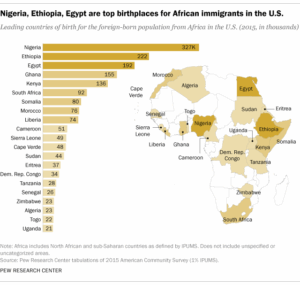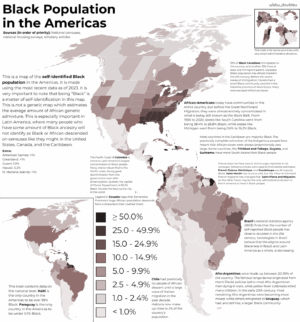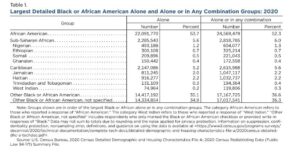By Eric Osiakwan & Yaw Owusu
“I am not African merely because I was born in Africa; rather, Africa lives within me.” These enduring words by Kwame Nkrumah, an iconic figure in Africa’s struggle for independence and Ghana’s inaugural president, encapsulate the increasing motivation among Caribbean people, African-Americans, Afro-Latinos, and others in the diaspora as they seek to reconnect with their ancestral roots.

After the highly publicized “Year of Return” initiative aimed at encouraging members of the diaspora to return to Africa, the Diaspora Affairs Office of Ghana reported that from 2019 to 2023, over 1,500 American descendants of Africans made their way back to Ghana. This was significant as Ghana became the first sub-Saharan nation to gain independence.

Sierra Leone’s initiative for citizenship is yielding comparable benefits by enhancing tourism and encouraging residence among Black individuals who were born and raised outside Africa.
Over 200 million individuals of African heritage reside beyond the continent’s borders, which means that when combining this with Africa’s own populace, they form a collective group of approximately 1.7 billion people—a number larger than that of China and nearing one-quarter of Earth’s total inhabitants.
The “Year of Return, Ghana 2019” initiative was launched by the Ghanaian government as an invitation for people from the African diaspora to return to Ghana. This event coincided with the 400-year mark since the initial shipment of enslaved Africans arrived in Virginia.
This served as an opportunity to honor the strength of the African spirit and promote investment and settling in Ghana. The program encompassed various happenings over the course of the year, such as cultural interactions, historic investigations, and occasions for members of the diaspora to forge connections with their heritage.

The triumph of that initiative resulted in the “Beyond The Return” program, designed to encourage tourism and repatriation for people of African descent living outside their ancestral homeland. This effort also aimed at strengthening economic ties, facilitating businesses, and attracting investments from individuals within the diaspora into Ghana and broader Africa.
Labeled “A Decade of African Renaissance,” the main pillars of this initiative are firmly grounded in
Exploring Ghana, Investing in Ghana, Diaspora Route to Ghana, and Advancing Pan-African Legacy and Innovation.
This essay highlights several entrepreneurs from the diaspora who led the initiative and set up their enterprises in Ghana and other African nations—thus setting an example for others to emulate.
In March 2025, Afreximbank, the African Export-Import Bank, launched an $180 million Africa Trade Center in Barbados aimed at bolstering economic relationships between Africa and the Caribbean.
The Afreximbank Africa Trade Centre (AATC) in Bridgetown, Barbados, which marks the first time an African business is launching a permanent presence in the Caribbean, will facilitate trade, investment and financial collaboration between the two regions.
The venture comprises a 12-storey twin-tower, featuring Afreximbank’s regional offices, a high-end hotel and a technology/SME incubation center, along with a Digital African Trade Gateway (DATG) to serve as a center for trade information, customer due diligence services, and a digital payment technology.
These resources will streamline trade between Africa, the Caribbean, and global markets. Additionally, a modern conference and exhibition center will connect with other Afreximbank Trade Centres in Nigeria, Zimbabwe, Egypt, Uganda, Côte d’Ivoire, and Cameroon, creating a global business network.
Case Study 2: A decade before the Afreximbank foray into the Western Hemisphere, the Republic Bank, one of the largest commercial banks in the Caribbean, acquired Ghana’s HFC Bank, which was first licensed as a non-bank financial institution specializing in mortgage transactions.
Case Study 3: In April 2025, the government of Trinidad signed a Bilateral Air Services Agreement (BASA) with Nigeria, laying a foundation for the first direct flight between the Caribbean and Africa.
Case Study 4: In 2015, Colin Gayle, Yvette Gayle, Roger Patton who were successful media and entertainment executives in the US returned to South Africa to partner with Kevin Boakye, an investment professional to establish the Africa Creative Agency a platform for the continent’s unique talent, untold stories, and rich culture. They create unique opportunities to advance the new African story: creativity, innovation, and excellence.
A growing number of African American-owned businesses export goods to Africa, generating an excess of $100 million in exports to Nigeria, Ghana and South Africa (combined) in 2023, according to the Progressive Policy Institute.
By 2030, the Black consumer market in the U.S. is expected to reach over $1.7 trillion in purchasing power. The African diaspora includes descendants of enslaved individuals brought to the Western Hemisphere from the 16th through the 19th centuries, along with those who migrated to Europe and the Americas from Africa starting around 1945 up until 2025.
African immigrants residing in the United States come from various parts of Africa. Among them, individuals from Nigeria, Ethiopia, Egypt, Ghana, and Kenya make up half of the total foreign-born African community in the US as of 2024.
The remittances sent by the African diaspora to the continent (\$100 billion) surpass both foreign direct investments (\$94 billion) and development assistance (\$42 billion).
The top 20 nations with the highest number of people belonging to the Black community (in millions) include:
|
|
In 2020, the United States Census Bureau stated that there are 47 million individuals in the nation with African ancestry.
Provided by SyndiGate Media Inc.
Syndigate.info
).


Leave a Reply